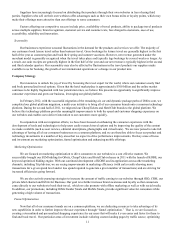Orbitz 2011 Annual Report Download - page 21
Download and view the complete annual report
Please find page 21 of the 2011 Orbitz annual report below. You can navigate through the pages in the report by either clicking on the pages listed below, or by using the keyword search tool below to find specific information within the annual report.21
We are dependent upon third-party systems and service providers, and any disruption or adverse change in their businesses
could have a material adverse effect on our business.
We currently rely on certain third-party computer systems, service providers and software companies, including the
electronic central reservation systems and GDSs of the airline, hotel and car rental industries. In particular, our businesses rely
on third parties to:
• conduct searches for airfares;
• process hotel room transactions;
• process credit card payments; and
• provide computer infrastructure critical to our business.
In addition, we rely on a group of business process outsourcing companies located in various countries to provide us
with call center and telesales services, back office administrative services such as ticketing fulfillment, hotel rate loading and
quality control and information technology services, as well as financial services. Any interruption in these third-party services
could have a material adverse effect on us.
Further, we currently utilize GDSs, including Worldspan, Galileo and Amadeus, to process a significant portion of our
bookings, and any interruption or deterioration in our GDS partners' products or services could prevent us from searching and
booking airline and car rental reservations, which would have a material adverse effect on our business.
Our success is dependent on our ability to maintain relationships with our technology partners. In the event our
arrangements with any of these third parties are impaired or terminated, we may not be able to find an alternative source of
systems support on a timely basis or on commercially reasonable terms, which could result in significant additional costs or
disruptions to our business. In addition, some of our agreements with third-party service providers can be terminated by those
parties on short notice and, in many cases, provide no recourse for service interruptions. A termination of these services could
have a material adverse effect on our business, financial condition and results of operations.
We rely on information technology to operate our businesses and maintain our competitiveness, and any failure to adapt to
technological developments or industry trends could harm our business.
We depend upon the use of sophisticated information technologies and systems, including technologies and systems
utilized for reservations, communications, procurement and administrative systems. Certain of our businesses also utilize third-
party fare search solutions and GDSs or other technologies. As our operations grow in both size and scope, we must
continuously improve and upgrade our systems and infrastructure to offer our customers enhanced products, services, features
and functionality, while maintaining the reliability and integrity of our systems and infrastructure. Our future success also
depends on our ability to adapt our services and infrastructure to meet rapidly evolving industry standards while continuing to
improve the performance, features and reliability of our service in response to competitive service and product offerings and
the changing demands of the marketplace. In particular, expanding our systems and infrastructure to meet any potential
increases in business volume will require us to commit additional financial, operational and technical resources before those
increases materialize, with no assurance that they actually will. Furthermore, our use of this technology could be challenged by
claims that we have infringed upon the patents, copyrights or other intellectual property rights of others.
In addition, we may not be able to maintain our existing systems, obtain new technologies and systems, or replace or
introduce new technologies and systems as quickly as our competitors or in a cost-effective manner. Also, we may fail to
achieve the benefits anticipated or required from any new technology or system, or we may be unable to devote financial
resources to new technologies and systems in the future. If any of these events occur, our business could suffer.
System interruptions and the lack of redundancy may cause us to lose customers or business opportunities.
Our inability to maintain and improve our information technology systems and infrastructure may result in system
interruptions. System interruptions and slow delivery times, unreliable service levels, prolonged or frequent service outages, or
insufficient capacity may prevent us from efficiently providing services to our customers, which could result in our losing
customers and revenue or incurring liabilities. In addition to the risks associated with inadequate maintenance or upgrading, our
information technologies and systems are vulnerable to damage or interruption from various causes, including:
• natural disasters, war and acts of terrorism;
• power losses, computer systems failure, Internet and telecommunications or data network failures, operator error,
























